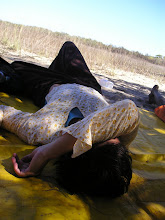After a discussion with my supervisor it seems I'm using something fairly akin to a Grounded Theory approach. This is something I've always read in academic papers - "this research uses a grounded approach with allows the meaning to emerge from the data" - and wondered if it's just a way to meander on into a topic without much thought.
I am pretty sure I've changed my mind about this now.
After wrestling with the idea of using Bourdieu to understand my data I've come back to the notion of not using any big 'T' theories to enter into my subject.
For a lovely look at the character and work of Bourdieu see the YouTube clip "Sociology is a Martial Art" http://www.youtube.com/watch?v=Csbu08SqAuc (note, there are multiple parts to this clip).
I've realised the point of using a grounded approach. It allows me to collect my data using open ended questioning and see what the data reveals in terms of theoretical understandings and concepts. Perhaps it will show up ideas around Bourdieu's habitus, distinction and fields of capital, but perhaps it won't and if I'm looking for evidence of these notions I will surely find them.
Konecki points out hat in allowing the findings to emerge from the data we therefore allow for serendipity, or accidental findings to occur which may not have happened had we used a more structured approach to analysing the data.
Grounded theory also uses theoretical memos which are designed to encourage the researcher to reflect on their own engagement with the data and the process of grounded theory.
From these ideas then I would suggest it is important to have a broad idea of the possible emergent qualities of the data. If I've only read a couple of papers on my topic I can only recognise those concepts in my data, where as if I understand multiple theories and a breadth of concepts around my topic many more things might 'emerge'. The role of the supervisor must be crucial in this as they can surely recognise many more things that the student in the data.
Konecki, Krzysztof Tomasz. "Grounded Theory and Serendipity. Natural History of a Research." Qualitative Sociology Review 4.1 (2008): n/a. Print.
More information on Grounded Theory: http://www.cprjournal.com/documents/groundedTheory.pdf
Friday, March 22, 2013
Subscribe to:
Post Comments (Atom)

No comments:
Post a Comment